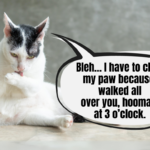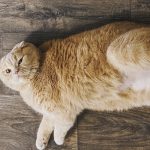Everyday grooming routine? It runs in every cat’s blood and from their kitten stage they know to always show up to social events with perfectly clean paws and groomed fur. Short- and long haired, purebreds and street cats – they all love cleanliness and can spend up to several hours per day on cleaning themselves up. Thanks to a special hook-like structure of the tongue, cats are perfectly capable of removing dirt and dust from the fur, pulling out the loose hair as well. However, swallowing excess fur can become dangerous. Do you know, fabCat, what hairballs are and how to deal with them? Today we’ll try to shed some light on the topic and help kitties who might have eaten too much of their fur.
Cats swallowing their fur is completely natural
A cat who spends several hours a day on grooming his fur doesn’t usually need help from his pawrents with cleaning himself. Unfortunately, even such clean creatures might have some troubles with their hygiene and unassisted grooming. By licking the fur, cats get some of the loose hairs into their digestive tract – it’s perfectly normal. Unfortunately, if the swallowed hair doesn’t manage to pass through with poop or the “loved” by cat Carers vomit, cats can have trouble with hairballs.
Balls of hair forming in the digestive tract because of more and more hair getting swallowed become a problem once the organism is not able to get rid of them on its own. Hair isn’t being digested, obviously, so at some point they start clumping together into so-called trichobezoars. The biggest risk concerns long haired cats, cats during the spring shedding season, cats with thick undercoat and sick cats who lose a lot of hair. It doesn’t mean that short-haired cats can’t get hairballs, but it’s much less likely.
Why are hairballs an issue?
A panoramic kitty barf with stomach contents is definitely not a favourite sight for any fabCat. Hairballs stuck inside the stomach irritates the mucous membrane, causes inflammations and, if it gets into the intestines, it can cause obstructions. A cat’s natural instinct will be to try to remove it by coughing and attempting vomiting. If it doesn’t work, cats can vomit with undigested stomach contents which weren’t able to pass further down the tract.
Hairballs can lead to apathy, lack of interest in playtime and activities, weakness, lack of appetite and, if the cat doesn’t eat enough, to quick weight loss. Cats can also get constipated, suffer tummy aches and show out-of-the-ordinary behaviour which seems like a good way of getting rid of the stuck hair – chewing on plants or eating paper may be another sign of hairballs.
Remember, fabCat, that if the problem of hairballs doesn’t get resolved on time and leads to intestine blockage, your cat can quickly become more and more sick. Non-functional digestive tract paired up with fecalith (from constipation) can lead to pet death.
Easy ways to avoid hairballs
We can’t stop a cat from swallowing fur during daily grooming – we can’t take away their ability to self clean and do their hair 🙂 It’s great that, as cat Carers, we have some great ways at our hands to help our kitties and avoid dangerous hairballs . Priority? Regular brushing!
By taking off the loose hair with a brush, a comb or a slicker glove, you’ll be able to get rid of most of the shedded fur and prevent your cat from swallowing large amounts of hair. In the case of short-haired cats outside the shedding season, 1-2 brushing sessions in a week will be enough, but for long-haired cats it might be necessary to repeat it 2-4 times a week and during the shedding season, even daily.
It’s worth remembering that excess shedding and grooming can be a sign of stress. Cats with anxiety, living in uncertain circumstances or fighting daily for their position in their home group are more likely to swallow more hair and get hairballs. The solution seems simple – let’s make sure our domestic tigers don’t feel stressed out in their home environment and, after stressful situations (like a vet visit) they can rest on their favourite cat bed or hide and calm their nerves in a cardboard cat house.
These products won’t work for hairballs
You can buy many different, special products designed to remove hairballs from a cat’s digestive system. You’ll usually find them in the form of ac cream snack, “anti-hairball” snacks and dried food promising hairball prevention. Unfortunately, most of these products give mediocre results and because of the ingredients, you’re better off substituting them for more natural products.
To remove hairballs, try not to use:
- Hairball cream snacks. They usually contain vegetable oils, sugar, malt, cheese, milk, dairy and a low % of animal products. Ingredients such as can irritate an already sensitive cat stomach, can lead to diarrhea and, what’s worse, they aren’t usually that effective against the actual hairballs.
- “Anti-hairball” snacks. Those with slightly better contents can be used quite regularly to prevent hairballs. Even with those, you should always be careful about vegetable oils – they’re not recommended for a cat’s diet.
- Dry “anti-hairball” food. Just like the cream snacks, they don’t usually contain good quality ingredients, there’s too many products non-recommended for cats and only a small percentage of grass or animal fats which are actually good for working through and passing hairballs.
Remember, dear fabCats, that there are some good quality products available, usually made by veterinary brands, safe to use for cats both during a hairball problem and as prevention. The key thing is to always analyze the ingredients list and, to be safe, consult the case with a vet or a cat dietitian.
What can you introduce into a cat’s diet to avoid hairballs?
Since we give up on some easy to buy anti-hairball products, what can we actually safely substitute them with to support a cat’s diet and help them pass hairballs? The answer is using special, veterinary products (with inulin, omega-3 and omega-6) and natural products, which you can easily find (or grow) at home.
- Cat grass. Not every cat loves it, but in our myKotty team we have had some cats who decided one day, out of the blue, to try it out and now can’t live without a day of nibbling on some grass. The greens are not digested in a cat’s stomach, but grass is a natural way of helping stuck hair to pass through and even wild cats use it to help their digestion. What’s most important, grass can be available for cats at all times, all year round.
- Animal fats. The best and safest choice would be geese or duck fat, as well as butter (used sparingly, when your cat is not interested in other types of fat but needs help with hairballs). Fats are very effective, which is why you only need a teaspoon once a week, treated as a snack or added to your cat’s food.
- Linseed. Minced grains can be added directly into cat food or cooked into goo which you can mix into your cat’s food or give your cat to lick off the spoon. It’s also a great way to help your cat with constipation.
Vet visit – when is it necessary?
At-home hairball prevention isn’t always successful and the signals your cat gives might not always be obvious. If you’re not finding any loose fur in a cat’s feces when cleaning up the litter box or when your cat barfs and any of the solutions above aren’t working, you should schedule a vet visit as soon as possible. A specialist will order an RTG or USG scan, verify what’s the problem and give your cat medication to help remove hairballs, as well as a IV drip to prevent further dehydration and weakness. In more difficult cases and without successful treatment with other medication, an enema or a surgical procedure might be necessary. We know, it sounds horrible, but it’s better to act quickly.
Dear fabCats – do your fluffers have issues with hairballs? Or maybe you’re already giving them proper supplements and snacks regularly to prevent the loose hair from clumping inside the kitty’s tummy? If you have any recommendations of products, feel free to share in the comments. With an upcoming spring and shedding season, every advice might be precious as gold!




